
dexto
A coding agent and general agent harness for building and orchestrating agentic applications.
Stars: 584
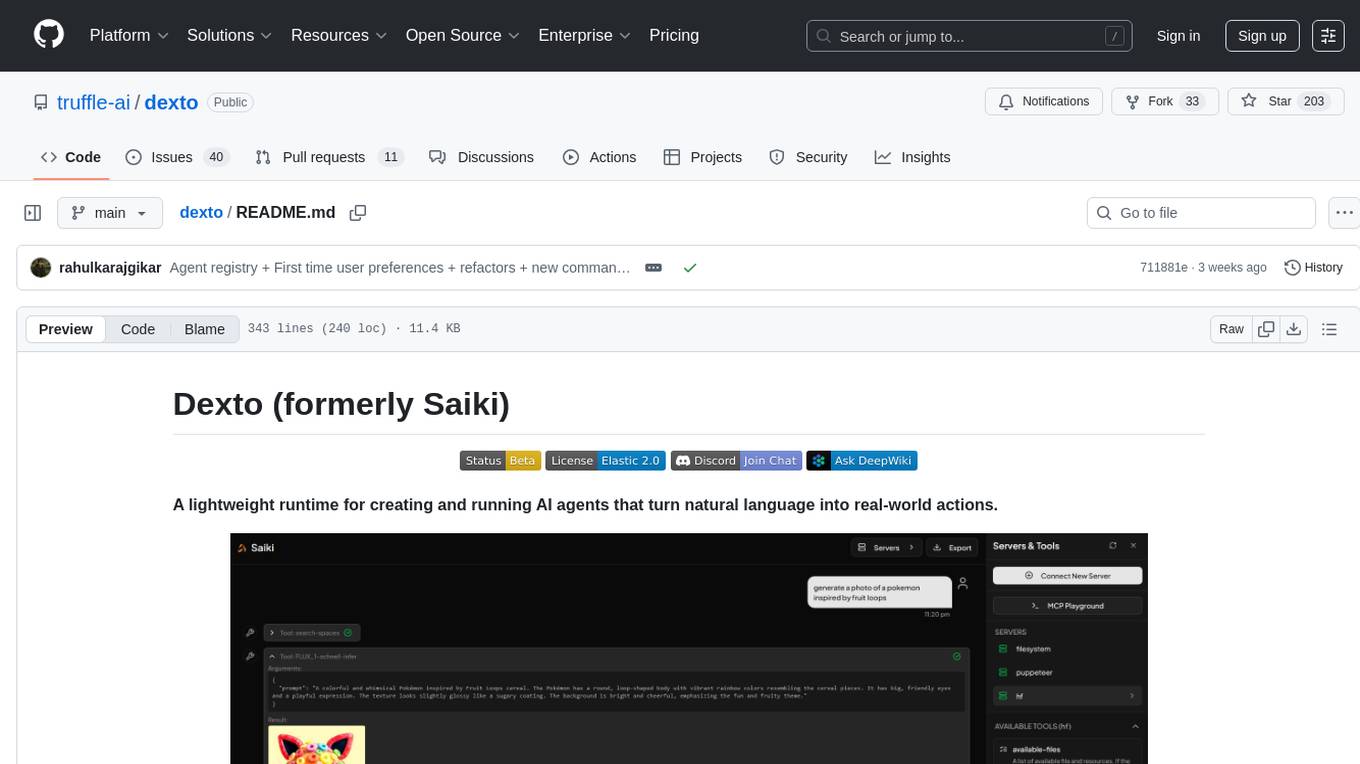
Dexto is a lightweight runtime for creating and running AI agents that turn natural language into real-world actions. It serves as the missing intelligence layer for building AI applications, standalone chatbots, or as the reasoning engine inside larger products. Dexto features a powerful CLI and Web UI for running AI agents, supports multiple interfaces, allows hot-swapping of LLMs from various providers, connects to remote tool servers via the Model Context Protocol, is config-driven with version-controlled YAML, offers production-ready core features, extensibility for custom services, and enables multi-agent collaboration via MCP and A2A.
README:
Deutsch | English | Español | français | 日本語 | 한국어 | Português | Русский | 中文
An open agent harness for AI applications—ships with a powerful coding agent.
Dexto is an agent harness—the orchestration layer that turns LLMs into reliable, stateful agents that can take actions, remember context, and recover from errors.
Think of it like an operating system for AI agents:
| Component | Analogy | Role |
|---|---|---|
| LLM | CPU | Raw processing power |
| Context Window | RAM | Working memory |
| Dexto | Operating System | Orchestration, state, tools, recovery |
| Your Agent | Application | Domain-specific logic and clients |
- Configuration-driven: Define agents in YAML. Swap models and tools without touching code.
- Batteries included: Session management, tool orchestration, memory, multimodal support, and observability—out of the box.
- Run anywhere: Local, cloud, or hybrid. CLI, Web UI, REST API, Discord, Telegram, or embedded in your app.
- Coding Agents – Build, debug, and refactor code autonomously
- Autonomous Agents – Plan, execute, and adapt to user goals
- Digital Companions – Assistants that remember context and anticipate needs
- MCP Clients & Servers – Connect tools, files, APIs via Model Context Protocol
- Multi-Agent Systems – Agents that collaborate, delegate, and solve complex tasks together
Dexto ships with a production-ready coding agent you can use immediately via the CLI or Web UI.
# Launch the coding agent (default)
dexto
# Or explicitly
dexto --agent coding-agentWhat it can do:
- Build new apps from scratch
- Read, write, and refactor code across your entire codebase
- Execute shell commands and run tests
- Spawn specialized sub-agents for exploration and planning
- Remember context across sessions with persistent memory
- Work with any of 50+ LLMs (swap models mid-conversation)
Ready-to-use interfaces:
- Web UI – Chat interface with file uploads, syntax highlighting, and MCP tool browser
-
CLI – Terminal-native with
/commands, streaming output, and session management
The coding agent is just one example of what you can build. Create your own agents by defining a YAML config—same architecture, your domain.
# Install globally via npm
npm install -g dexto
# Or build from source
git clone https://github.com/truffle-ai/dexto.git
cd dexto && pnpm install && pnpm install-cli# Start Dexto (launches setup wizard on first run)
dextoMore options:
dexto --mode cli # Terminal mode
dexto -p "create a landing page for a coffee shop" # One-shot task
dexto --auto-approve "refactor this codebase" # Skip confirmations
dexto -m claude-sonnet-4-5-20250929 # Switch models
dexto --help # Explore all optionsInside the interactive CLI, type / to explore commands—switch models, manage sessions, configure tools, and more.
# Configure defaults like LLM provider/model, API keys, or download local models
dexto setupLogs are stored in ~/.dexto/logs/. Use DEXTO_LOG_LEVEL=debug for verbose output.
Switch models mid-conversation—no code changes, no restarts.
| Provider | Models |
|---|---|
| OpenAI | gpt-5.2, gpt-5.2-pro, gpt-5.2-codex, o4-mini |
| Anthropic | Claude Sonnet, Opus, Haiku (with extended thinking) |
| Gemini 3 Pro, 2.5 Pro/Flash | |
| Groq | Llama 4, Qwen, DeepSeek |
| xAI | Grok 4, Grok 3 |
| Local | Ollama, GGUF via node-llama-cpp (Llama, Qwen, Mistral, etc.) |
| + Gateways | OpenRouter, AWS Bedrock, Vertex AI, LiteLLM |
Run locally for privacy: Local models keep data on your machine with automatic GPU detection (Metal, CUDA, Vulkan).
Connect to Model Context Protocol servers—Puppeteer, Linear, ElevenLabs, Firecrawl, Sora, and more.
# agents/my-agent.yml
mcpServers:
filesystem:
type: stdio
command: npx
args: ['-y', '@modelcontextprotocol/server-filesystem', '.']
browser:
type: stdio
command: npx
args: ['-y', '@anthropics/mcp-server-puppeteer']Browse and add servers from the MCP Store in the Web UI or via /mcp commands in the CLI.
Fine-grained control over what your agent can do:
toolConfirmation:
mode: manual # Require approval for each tool
# mode: auto-approve # Trust mode for local development
toolPolicies:
alwaysAllow:
- mcp--filesystem--read_file
- mcp--filesystem--list_directory
alwaysDeny:
- mcp--filesystem--delete_fileAgents remember which tools you've approved per session.
Conversations persist across restarts. Create memories that shape agent behavior.
# Continue last conversation
dexto -c
# Resume specific session
dexto -r session-abc123
# Search across all conversations
dexto search "database schema"Agents can spawn specialized sub-agents to handle complex subtasks. The coding agent uses this to delegate exploration:
# In your agent config
customTools:
- type: agent-spawner
allowedAgents: ["explore-agent"]
maxConcurrentAgents: 5
defaultTimeout: 300000 # 5 minutesBuilt-in sub-agents:
- explore-agent – Fast, read-only codebase exploration
Any agent in the Agent Registry can be spawned as a sub-agent—including custom agents you create and register.
Sub-agents run ephemerally, auto-cleanup after completion, and forward tool approvals to the parent—so users see one unified approval flow.
| Mode | Command | Use Case |
|---|---|---|
| Web UI | dexto |
Chat interface with file uploads (default) |
| CLI | dexto --mode cli |
Terminal interaction |
| Web Server | dexto --mode server |
REST & SSE APIs |
| MCP Server | dexto --mode mcp |
Expose agent as an MCP server over stdio |
Platform integrations: Discord, Telegram
Dexto as an MCP Server
Transport: stdio
Connect your Dexto agent as an MCP server in Claude Code or Cursor:
dexto --mode mcp --auto-approve --no-elicitation # Default agent
dexto --mode mcp --agent coding-agent --auto-approve --no-elicitation
npx dexto --mode mcp --agent coding-agent --auto-approve --no-elicitationExample MCP config for Claude Code or Cursor:
{
"command": "npx",
"args": ["-y", "dexto", "--mode", "mcp", "--agent", "coding-agent", "--auto-approve", "--no-elicitation"]
}--auto-approve and --no-elicitation are required for MCP mode since it runs non-interactively.
Transport: http/sse
dexto --mode server exposes your agent as an MCP server at /mcp for remote clients:
dexto --mode server --port 3001
ngrok http 3001 # Optional: expose publiclyBuild AI agents programmatically. Everything the CLI does, your code can too.
npm install @dexto/coreimport { DextoAgent } from '@dexto/core';
const agent = new DextoAgent({
llm: { provider: 'openai', model: 'gpt-5.2', apiKey: process.env.OPENAI_API_KEY }
});
await agent.start();
const session = await agent.createSession();
const response = await agent.generate('What is TypeScript?', session.id);
console.log(response.content);
// Streaming
for await (const event of await agent.stream('Write a story', session.id)) {
if (event.name === 'llm:chunk') process.stdout.write(event.content);
}
// Multimodal
await agent.generate([
{ type: 'text', text: 'Describe this image' },
{ type: 'image', image: base64Data, mimeType: 'image/png' }
], session.id);
// Switch models mid-conversation
await agent.switchLLM({ model: 'claude-sonnet-4-5-20250929' });Start a server programmatically:
Start a Dexto server programmatically to expose REST and SSE streaming APIs to interact and manage your agent backend.
import { DextoAgent } from '@dexto/core';
import { loadAgentConfig, startHonoApiServer } from 'dexto';
const config = await loadAgentConfig('./agents/my-agent.yml');
const agent = new DextoAgent(config);
const { server } = await startHonoApiServer(agent, 3001);
// POST /api/message, GET /api/sessions, etc.This starts an HTTP server with full REST and SSE APIs, enabling integration with web frontends, webhooks, and other services. See the REST API Documentation for available endpoints.
Advanced SDK Usage
Create and manage multiple conversation sessions with persistent storage.
const agent = new DextoAgent(config);
await agent.start();
// Create and manage sessions
const session = await agent.createSession('user-123');
await agent.generate('Hello, how can you help me?', session.id);
// List and manage sessions
const sessions = await agent.listSessions();
const history = await agent.getSessionHistory('user-123');
await agent.deleteSession('user-123');
// Search across conversations
const results = await agent.searchMessages('bug fix', { limit: 10 });Switch between models and providers dynamically.
// Get current configuration
const currentLLM = agent.getCurrentLLMConfig();
// Switch models (provider inferred automatically)
await agent.switchLLM({ model: 'gpt-5.2' });
await agent.switchLLM({ model: 'claude-sonnet-4-5-20250929' });
// Switch model for a specific session
await agent.switchLLM({ model: 'gpt-5.2' }, 'session-123');
// Get supported providers and models
const providers = agent.getSupportedProviders();
const models = agent.getSupportedModels();For advanced MCP server management, use the MCPManager directly.
import { MCPManager } from '@dexto/core';
const manager = new MCPManager();
// Connect to MCP servers
await manager.connectServer('filesystem', {
type: 'stdio',
command: 'npx',
args: ['-y', '@modelcontextprotocol/server-filesystem', '.']
});
// Access tools, prompts, and resources
const tools = await manager.getAllTools();
const prompts = await manager.getAllPrompts();
const resources = await manager.getAllResources();
// Execute tools
const result = await manager.executeTool('readFile', { path: './README.md' });
await manager.disconnectAll();Configure storage backends for production.
# agents/production-agent.yml
storage:
cache:
type: redis
url: $REDIS_URL
database:
type: postgres
connectionString: $POSTGRES_CONNECTION_STRING
sessions:
maxSessions: 1000
sessionTTL: 86400000 # 24 hoursSupported Backends:
- Cache: Redis, In-Memory
- Database: PostgreSQL, SQLite, In-Memory
See the Storage Configuration guide for details.
Pre-built agents for common use cases:
# List available agents
dexto list-agents
# Install and run
dexto install coding-agent podcast-agent
dexto --agent coding-agentAvailable: Coding, Podcast, Image Editor, Video (Sora), Database, GitHub, Triage (multi-agent), and more.
See the full Agent Registry.
Dexto treats each configuration as a unique agent allowing you to define and save combinations of LLMs, servers, storage options, etc. based on your needs for easy portability. Define agents in version-controlled YAML. Change the file, reload, and chat—state, memory, and tools update automatically.
# agents/production-agent.yml
llm:
provider: anthropic
model: claude-sonnet-4-5-20250929
apiKey: $ANTHROPIC_API_KEY
mcpServers:
filesystem:
type: stdio
command: npx
args: ['-y', '@modelcontextprotocol/server-filesystem', '.']
systemPrompt: |
You are a helpful assistant with filesystem access.
storage:
cache:
type: redis
url: $REDIS_URL
database:
type: postgres
connectionString: $POSTGRES_CONNECTION_STRING
toolConfirmation:
mode: manualSwitch between providers instantly—no code changes required.
| Provider | Models | Setup |
|---|---|---|
| OpenAI |
gpt-5.2, gpt-5.2-pro, gpt-5.2-codex, o4-mini
|
API key |
| Anthropic |
claude-sonnet-4-5-20250929, claude-opus-4-5-20250929, extended thinking |
API key |
gemini-3-pro, gemini-2.5-pro, gemini-2.5-flash
|
API key | |
| Groq |
llama-4-scout, qwen-qwq, deepseek-r1-distill
|
API key |
| xAI |
grok-4, grok-3, grok-3-fast
|
API key |
| Cohere |
command-r-plus, command-r
|
API key |
| Provider | Models | Setup |
|---|---|---|
| Ollama | Llama, Qwen, Mistral, DeepSeek, etc. | Local install |
| node-llama-cpp | Any GGUF model | Bundled (auto GPU detection: Metal, CUDA, Vulkan) |
| Provider | Models | Setup |
|---|---|---|
| AWS Bedrock | Claude, Llama, Mistral | AWS credentials |
| Google Vertex AI | Gemini, Claude | GCP credentials |
| Provider | Access | Setup |
|---|---|---|
| OpenRouter | 100+ models from multiple providers | API key |
| LiteLLM | Unified API for any provider | Self-hosted or API key |
| Glama | Multi-provider gateway | API key |
# Switch models via CLI
dexto -m claude-sonnet-4-5-20250929
dexto -m gemini-2.5-pro
dexto -m llama-4-scoutSwitch within interactive CLI (/model) or Web UI without config changes.
See the Configuration Guide.
| Image Editor | MCP Store | Portable Agents |
|---|---|---|
 |
 |
 |
| Face detection & annotation using OpenCV | Browse and add MCPs | Use agents in Cursor, Claude Code via MCP |
More Examples
Build applications from natural language:
dexto --agent coding-agent
# "Create a snake game and open it in the browser"
Generate multi-speaker audio content:
dexto --agent podcast-agentCoordinate specialized agents:
dexto --agent triage-agent
Persistent context that shapes behavior:

Agents generate forms for structured input:

CLI Reference
Usage: dexto [options] [command] [prompt...]
Basic Usage:
dexto Start web UI (default)
dexto "query" Run one-shot query
dexto --mode cli Interactive CLI
Session Management:
dexto -c Continue last conversation
dexto -r <id> Resume specific session
Options:
-a, --agent <path> Agent config file or ID
-m, --model <model> LLM model to use
--auto-approve Skip tool confirmations
--no-elicitation Disable elicitation prompts
--mode <mode> web | cli | server | mcp
--port <port> Server port
Commands:
setup Configure global preferences
install <agents...> Install agents from registry
list-agents List available agents
session list|history Manage sessions
search <query> Search conversation history
Full reference: dexto --help
- Quick Start – Get running in minutes
- Configuration Guide – Agents, LLMs, tools
- SDK Reference – Programmatic usage
- REST API – HTTP endpoints
We collect anonymous usage data (no personal/sensitive info) to help improve Dexto. This includes:
- Commands used
- Command execution time
- Error occurrences
- System information (OS, Node version)
- LLM Models used
To opt-out:
Set env variable DEXTO_ANALYTICS_DISABLED=1
See CONTRIBUTING.md.
Built by Truffle AI. Join Discord for support.
If you find Dexto useful, please give us a ⭐ on GitHub—it helps a lot!
Elastic License 2.0. See LICENSE.
For Tasks:
Click tags to check more tools for each tasksFor Jobs:
Alternative AI tools for dexto
Similar Open Source Tools

dexto
Dexto is a lightweight runtime for creating and running AI agents that turn natural language into real-world actions. It serves as the missing intelligence layer for building AI applications, standalone chatbots, or as the reasoning engine inside larger products. Dexto features a powerful CLI and Web UI for running AI agents, supports multiple interfaces, allows hot-swapping of LLMs from various providers, connects to remote tool servers via the Model Context Protocol, is config-driven with version-controlled YAML, offers production-ready core features, extensibility for custom services, and enables multi-agent collaboration via MCP and A2A.
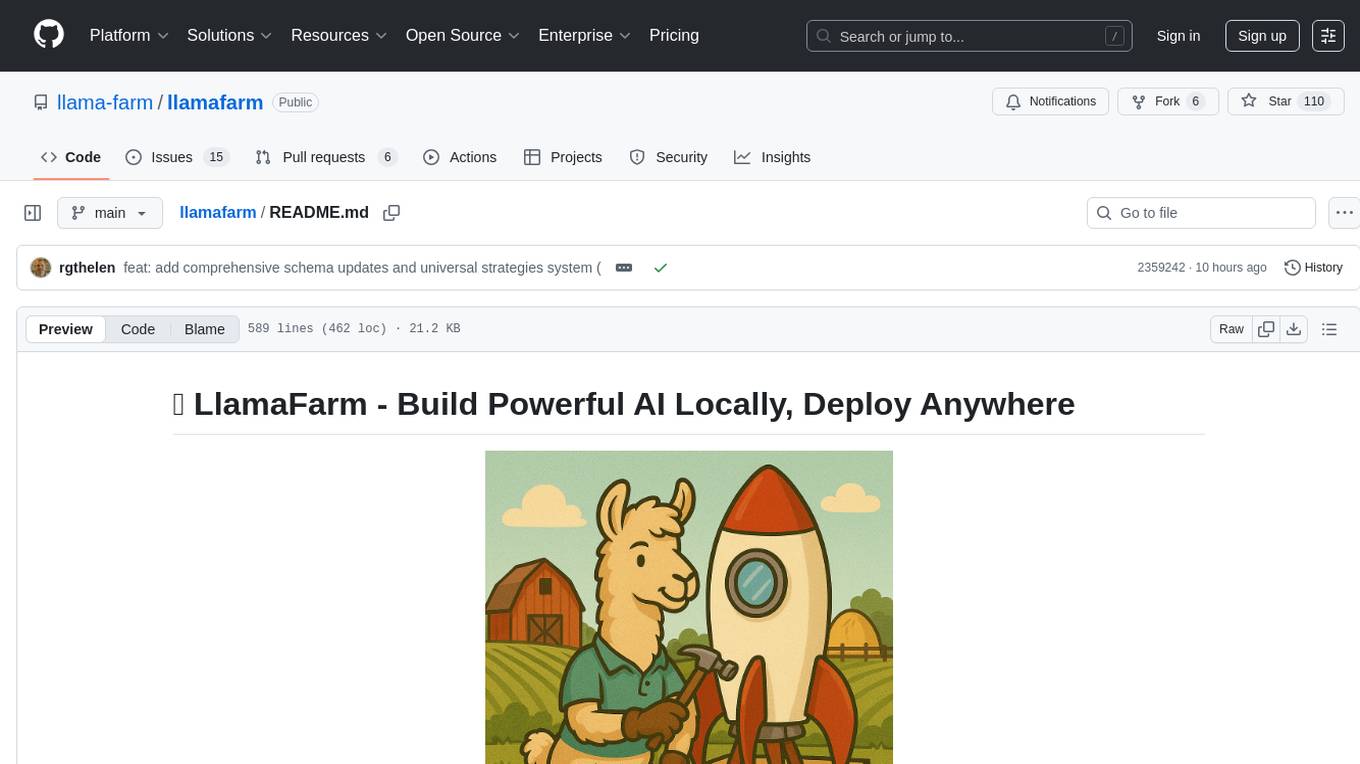
llamafarm
LlamaFarm is a comprehensive AI framework that empowers users to build powerful AI applications locally, with full control over costs and deployment options. It provides modular components for RAG systems, vector databases, model management, prompt engineering, and fine-tuning. Users can create differentiated AI products without needing extensive ML expertise, using simple CLI commands and YAML configs. The framework supports local-first development, production-ready components, strategy-based configuration, and deployment anywhere from laptops to the cloud.
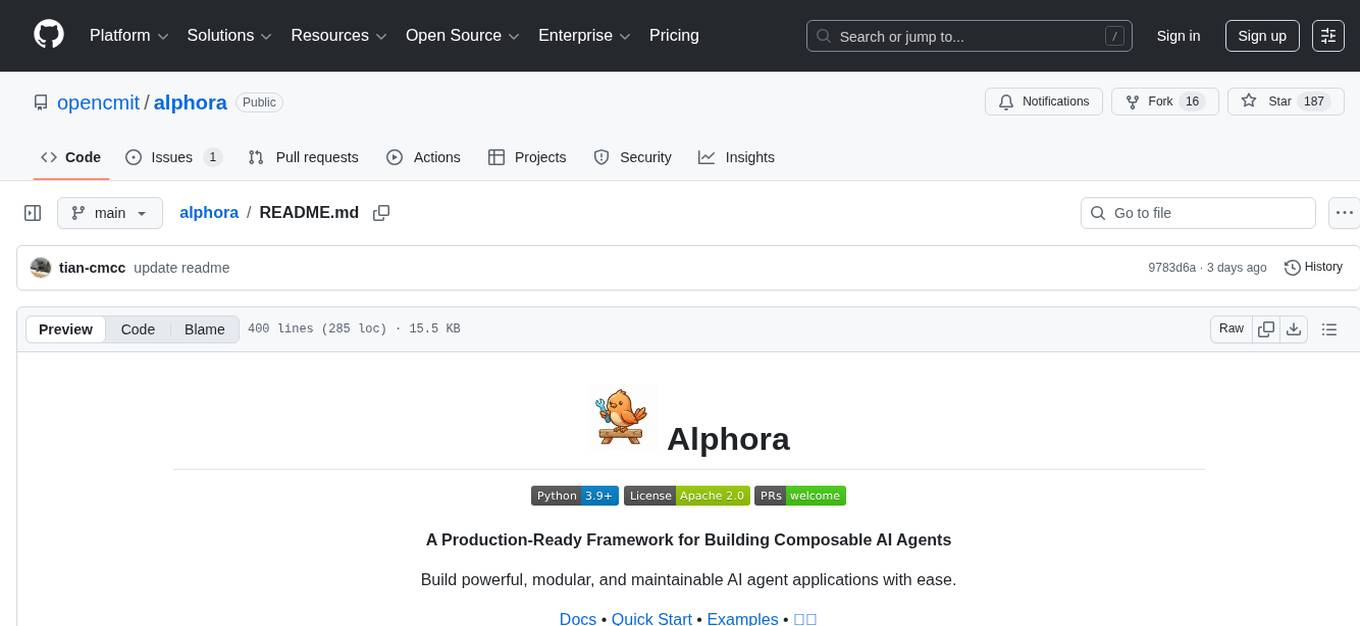
alphora
Alphora is a full-stack framework for building production AI agents, providing agent orchestration, prompt engineering, tool execution, memory management, streaming, and deployment with an async-first, OpenAI-compatible design. It offers features like agent derivation, reasoning-action loop, async streaming, visual debugger, OpenAI compatibility, multimodal support, tool system with zero-config tools and type safety, prompt engine with dynamic prompts, memory and storage management, sandbox for secure execution, deployment as API, and more. Alphora allows users to build sophisticated AI agents easily and efficiently.
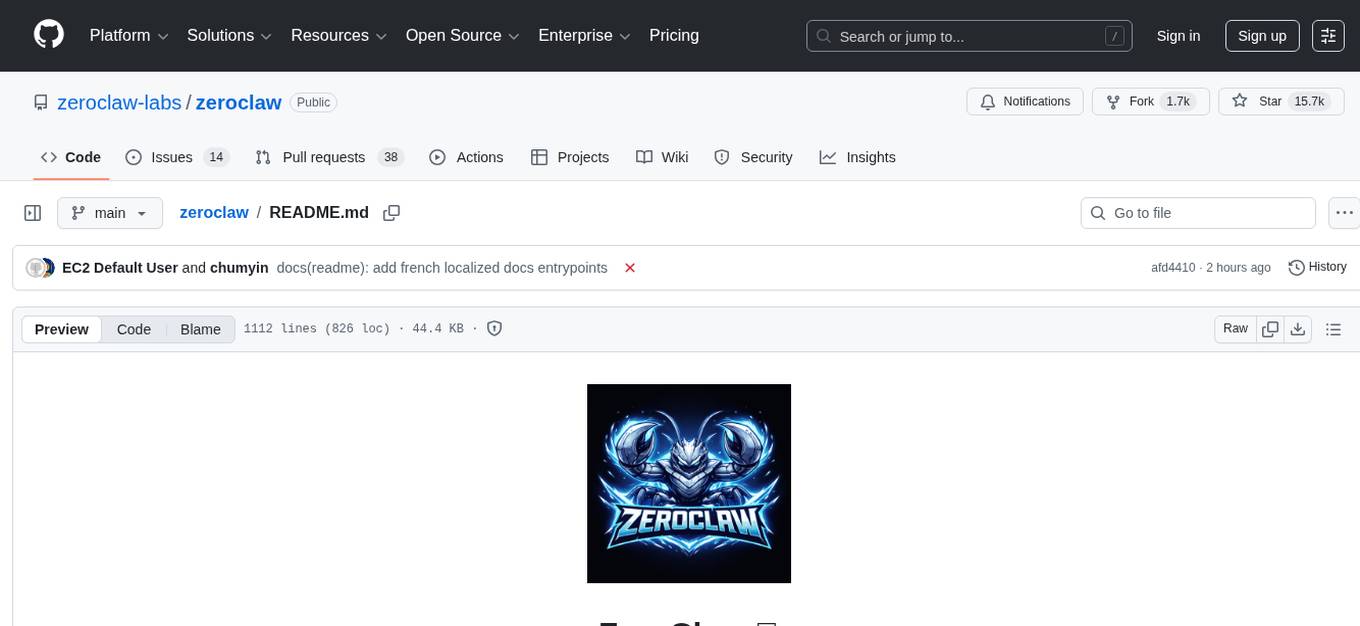
zeroclaw
ZeroClaw is a fast, small, and fully autonomous AI assistant infrastructure built with Rust. It features a lean runtime, cost-efficient deployment, fast cold starts, and a portable architecture. It is secure by design, fully swappable, and supports OpenAI-compatible provider support. The tool is designed for low-cost boards and small cloud instances, with a memory footprint of less than 5MB. It is suitable for tasks like deploying AI assistants, swapping providers/channels/tools, and pluggable everything.
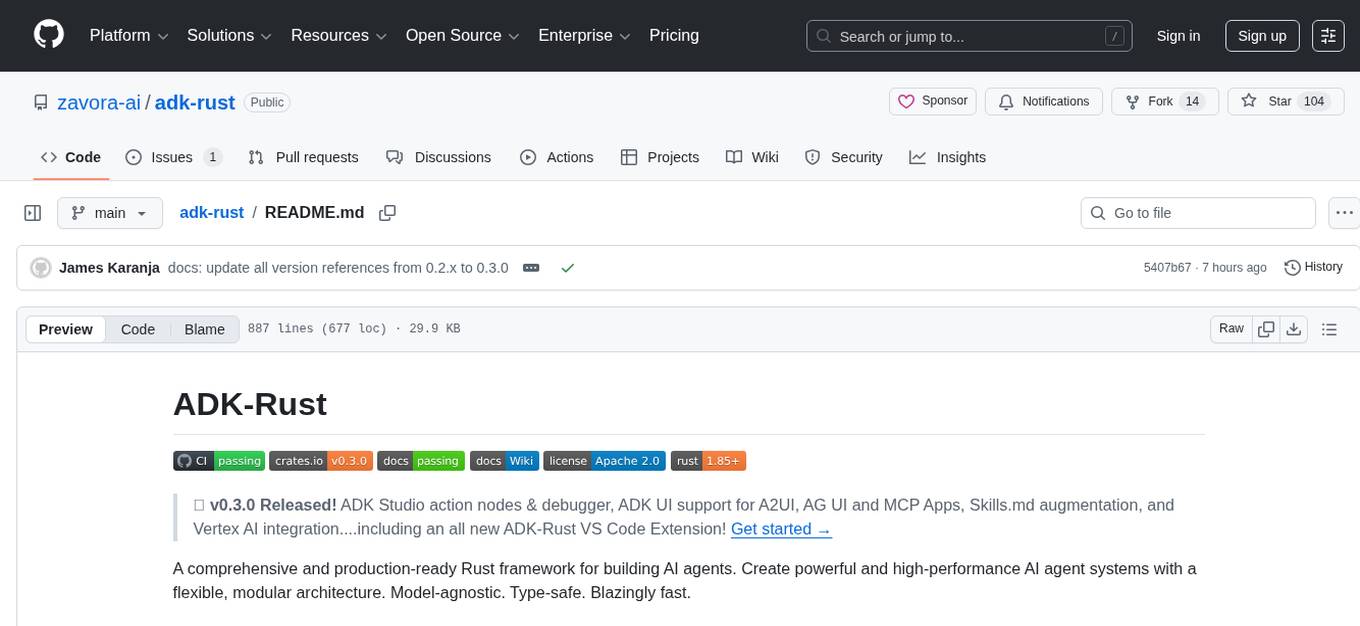
adk-rust
ADK-Rust is a comprehensive and production-ready Rust framework for building AI agents. It features type-safe agent abstractions with async execution and event streaming, multiple agent types including LLM agents, workflow agents, and custom agents, realtime voice agents with bidirectional audio streaming, a tool ecosystem with function tools, Google Search, and MCP integration, production features like session management, artifact storage, memory systems, and REST/A2A APIs, and a developer-friendly experience with interactive CLI, working examples, and comprehensive documentation. The framework follows a clean layered architecture and is production-ready and actively maintained.
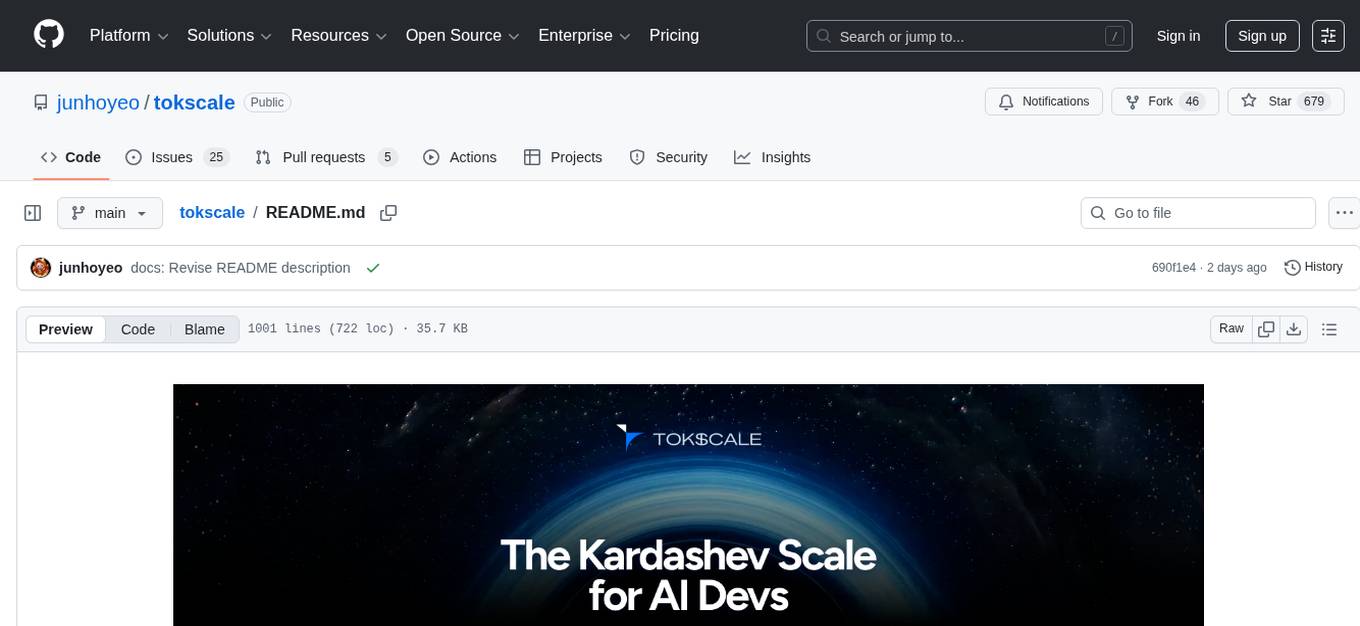
tokscale
Tokscale is a high-performance CLI tool and visualization dashboard for tracking token usage and costs across multiple AI coding agents. It helps monitor and analyze token consumption from various AI coding tools, providing real-time pricing calculations using LiteLLM's pricing data. Inspired by the Kardashev scale, Tokscale measures token consumption as users scale the ranks of AI-augmented development. It offers interactive TUI mode, multi-platform support, real-time pricing, detailed breakdowns, web visualization, flexible filtering, and social platform features.
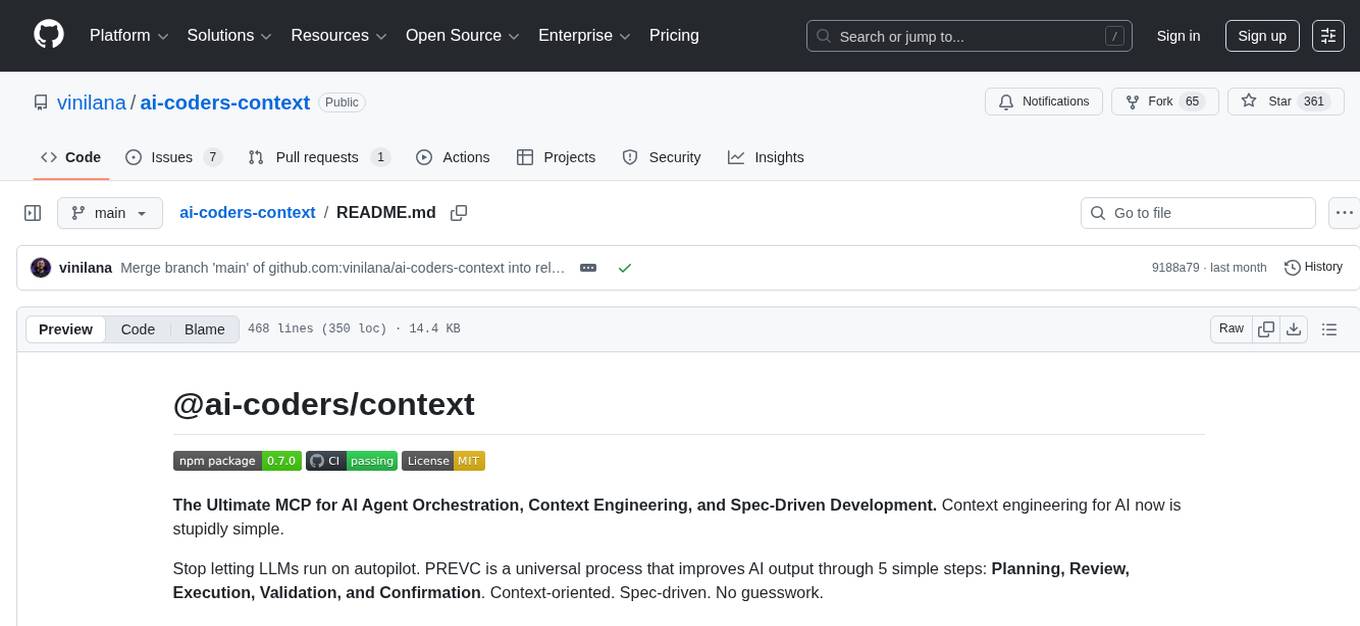
ai-coders-context
The @ai-coders/context repository provides the Ultimate MCP for AI Agent Orchestration, Context Engineering, and Spec-Driven Development. It simplifies context engineering for AI by offering a universal process called PREVC, which consists of Planning, Review, Execution, Validation, and Confirmation steps. The tool aims to address the problem of context fragmentation by introducing a single `.context/` directory that works universally across different tools. It enables users to create structured documentation, generate agent playbooks, manage workflows, provide on-demand expertise, and sync across various AI tools. The tool follows a structured, spec-driven development approach to improve AI output quality and ensure reproducible results across projects.
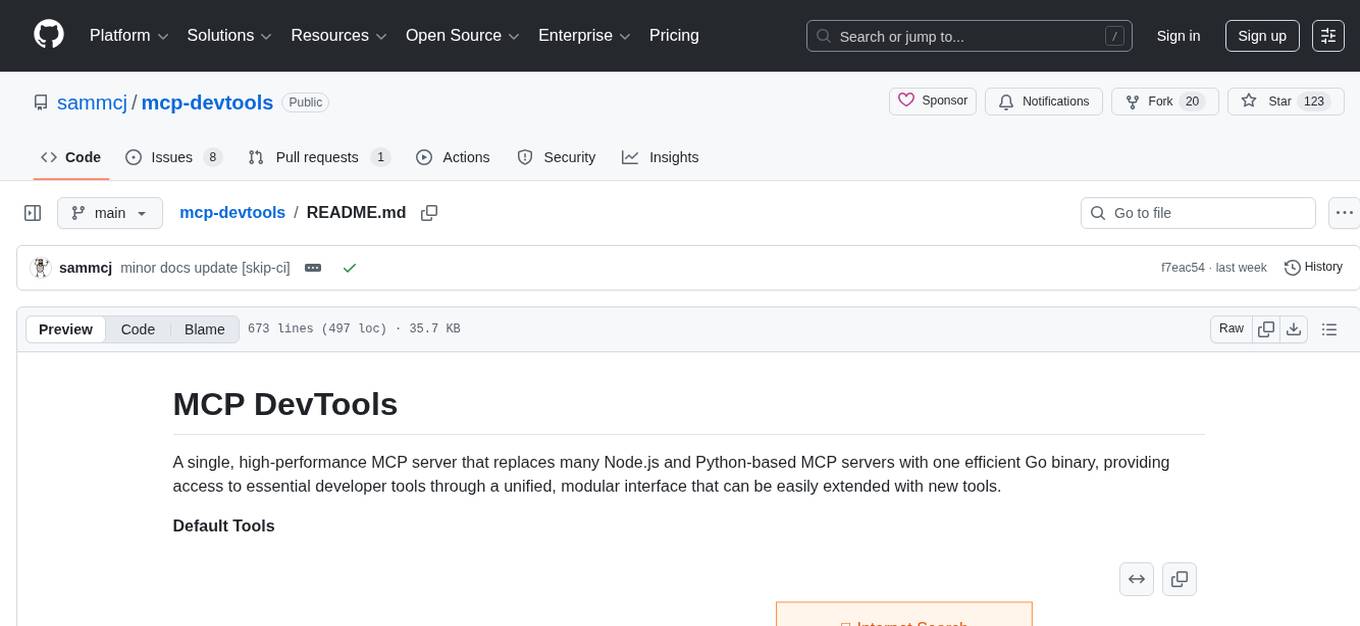
mcp-devtools
MCP DevTools is a high-performance server written in Go that replaces multiple Node.js and Python-based servers. It provides access to essential developer tools through a unified, modular interface. The server is efficient, with minimal memory footprint and fast response times. It offers a comprehensive tool suite for agentic coding, including 20+ essential developer agent tools. The tool registry allows for easy addition of new tools. The server supports multiple transport modes, including STDIO, HTTP, and SSE. It includes a security framework for multi-layered protection and a plugin system for adding new tools.
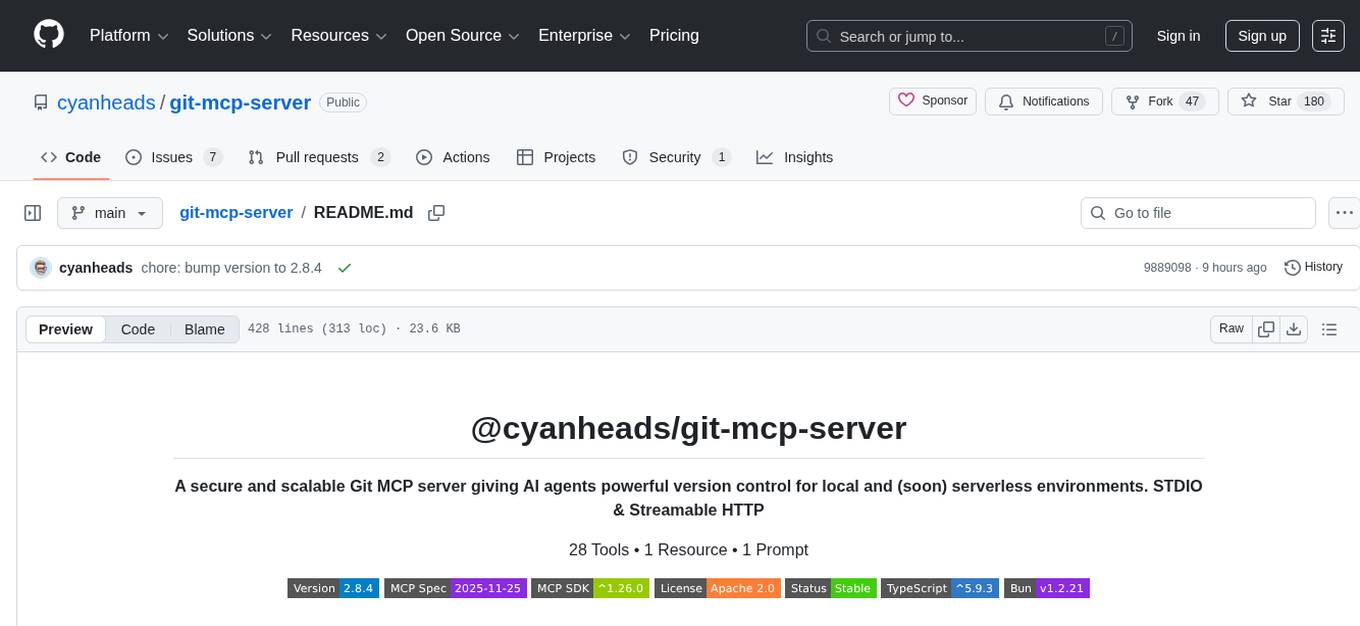
git-mcp-server
A secure and scalable Git MCP server providing AI agents with powerful version control capabilities for local and serverless environments. It offers 28 comprehensive Git operations organized into seven functional categories, resources for contextual information about the Git environment, and structured prompt templates for guiding AI agents through complex workflows. The server features declarative tools, robust error handling, pluggable authentication, abstracted storage, full-stack observability, dependency injection, and edge-ready architecture. It also includes specialized features for Git integration such as cross-runtime compatibility, provider-based architecture, optimized Git execution, working directory management, configurable Git identity, safety features, and commit signing.
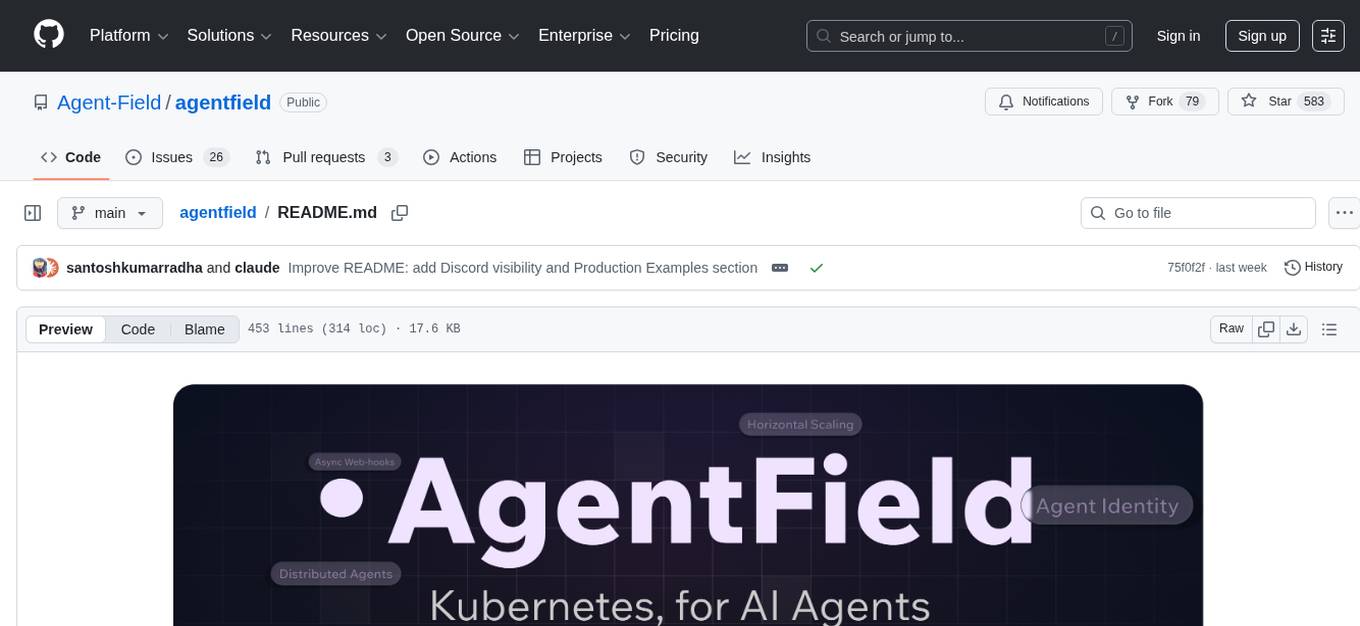
agentfield
AgentField is an open-source control plane designed for autonomous AI agents, providing infrastructure for agents to make decisions beyond chatbots. It offers features like scaling infrastructure, routing & discovery, async execution, durable state, observability, trust infrastructure with cryptographic identity, verifiable credentials, and policy enforcement. Users can write agents in Python, Go, TypeScript, or interact via REST APIs. The tool enables the creation of AI backends that reason autonomously within defined boundaries, offering predictability and flexibility. AgentField aims to bridge the gap between AI frameworks and production-ready infrastructure for AI agents.
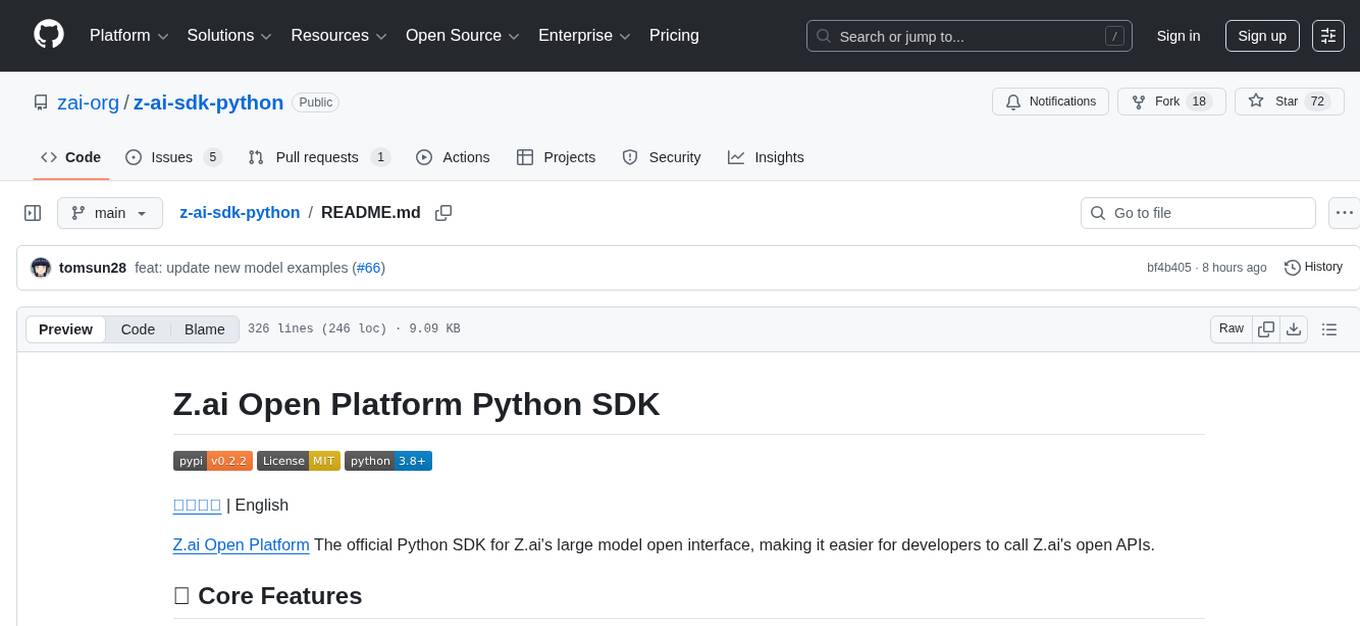
z-ai-sdk-python
Z.ai Open Platform Python SDK is the official Python SDK for Z.ai's large model open interface, providing developers with easy access to Z.ai's open APIs. The SDK offers core features like chat completions, embeddings, video generation, audio processing, assistant API, and advanced tools. It supports various functionalities such as speech transcription, text-to-video generation, image understanding, and structured conversation handling. Developers can customize client behavior, configure API keys, and handle errors efficiently. The SDK is designed to simplify AI interactions and enhance AI capabilities for developers.
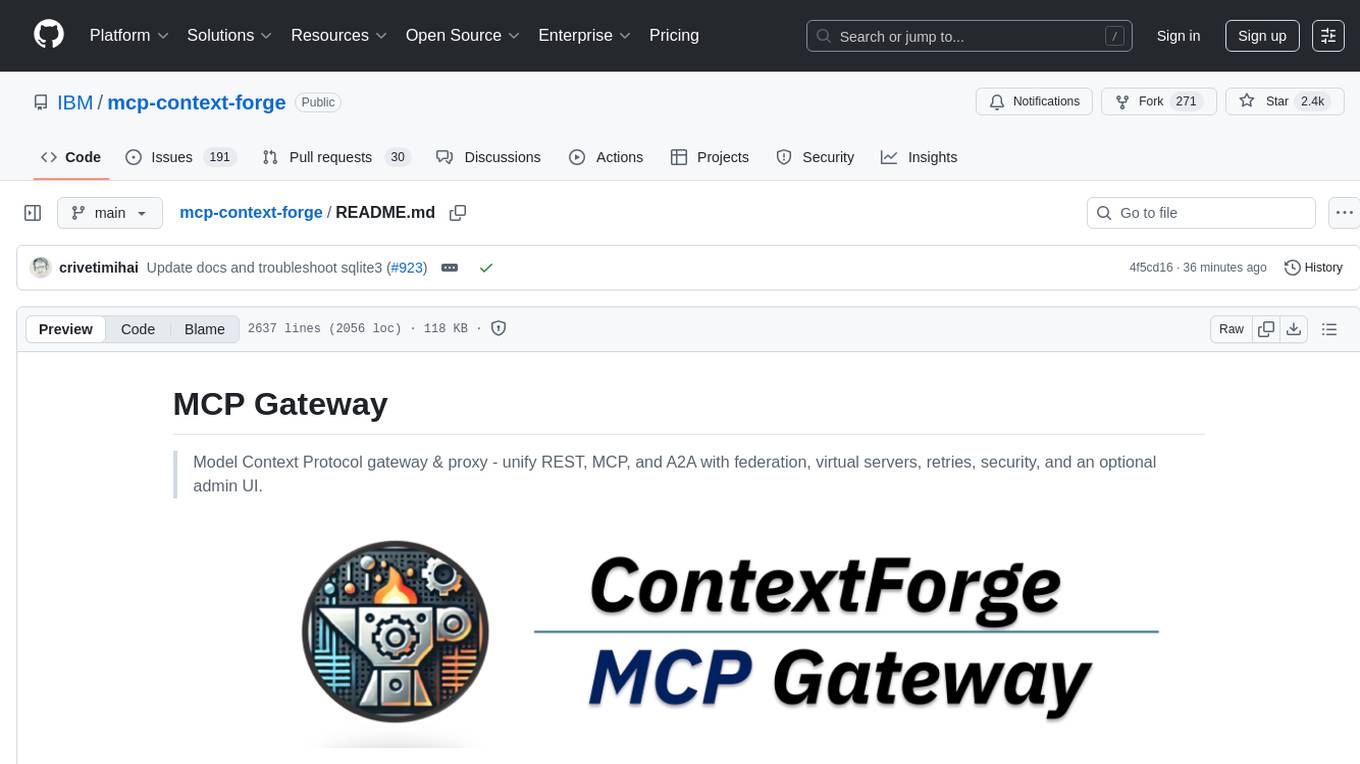
mcp-context-forge
MCP Context Forge is a powerful tool for generating context-aware data for machine learning models. It provides functionalities to create diverse datasets with contextual information, enhancing the performance of AI algorithms. The tool supports various data formats and allows users to customize the context generation process easily. With MCP Context Forge, users can efficiently prepare training data for tasks requiring contextual understanding, such as sentiment analysis, recommendation systems, and natural language processing.
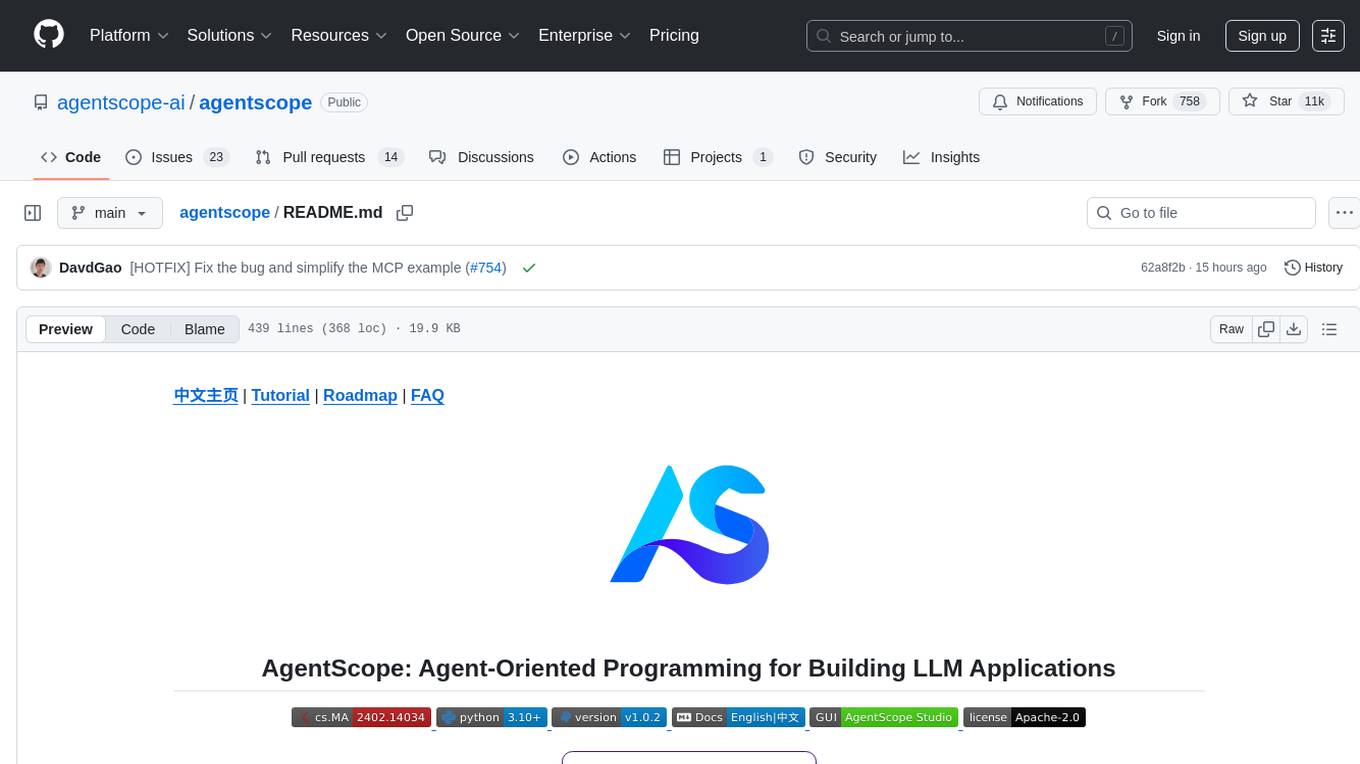
agentscope
AgentScope is an agent-oriented programming tool for building LLM (Large Language Model) applications. It provides transparent development, realtime steering, agentic tools management, model agnostic programming, LEGO-style agent building, multi-agent support, and high customizability. The tool supports async invocation, reasoning models, streaming returns, async/sync tool functions, user interruption, group-wise tools management, streamable transport, stateful/stateless mode MCP client, distributed and parallel evaluation, multi-agent conversation management, and fine-grained MCP control. AgentScope Studio enables tracing and visualization of agent applications. The tool is highly customizable and encourages customization at various levels.
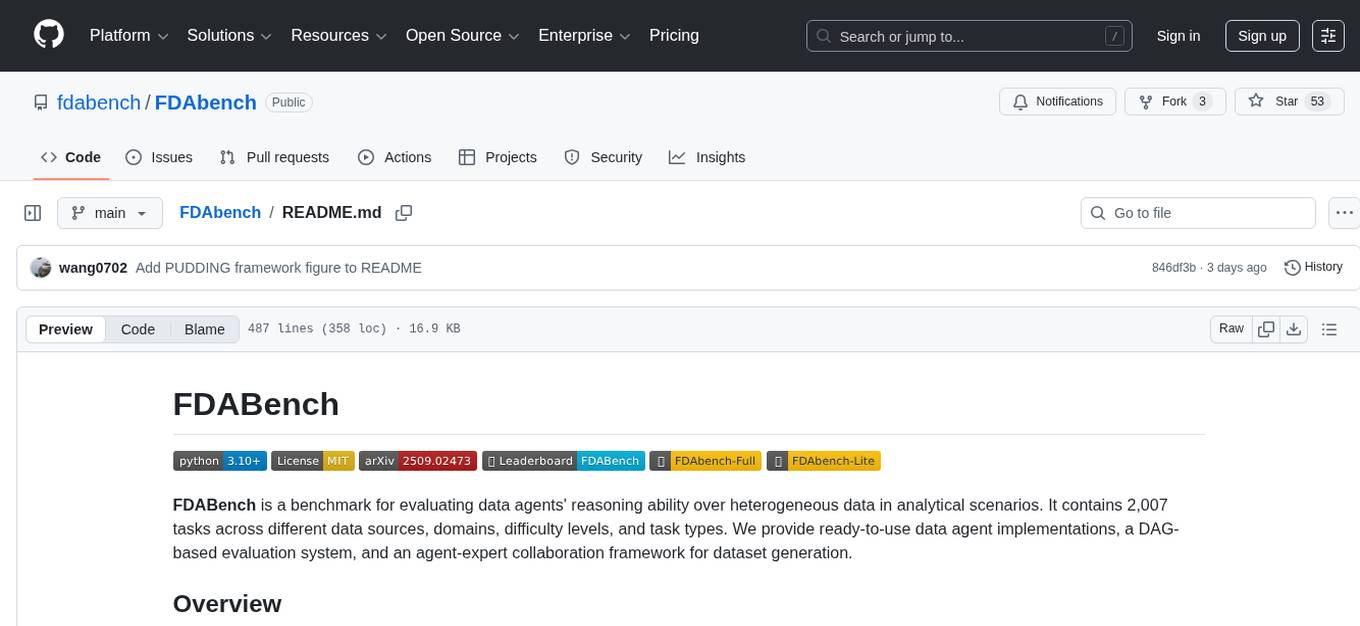
FDAbench
FDABench is a benchmark tool designed for evaluating data agents' reasoning ability over heterogeneous data in analytical scenarios. It offers 2,007 tasks across various data sources, domains, difficulty levels, and task types. The tool provides ready-to-use data agent implementations, a DAG-based evaluation system, and a framework for agent-expert collaboration in dataset generation. Key features include data agent implementations, comprehensive evaluation metrics, multi-database support, different task types, extensible framework for custom agent integration, and cost tracking. Users can set up the environment using Python 3.10+ on Linux, macOS, or Windows. FDABench can be installed with a one-command setup or manually. The tool supports API configuration for LLM access and offers quick start guides for database download, dataset loading, and running examples. It also includes features like dataset generation using the PUDDING framework, custom agent integration, evaluation metrics like accuracy and rubric score, and a directory structure for easy navigation.
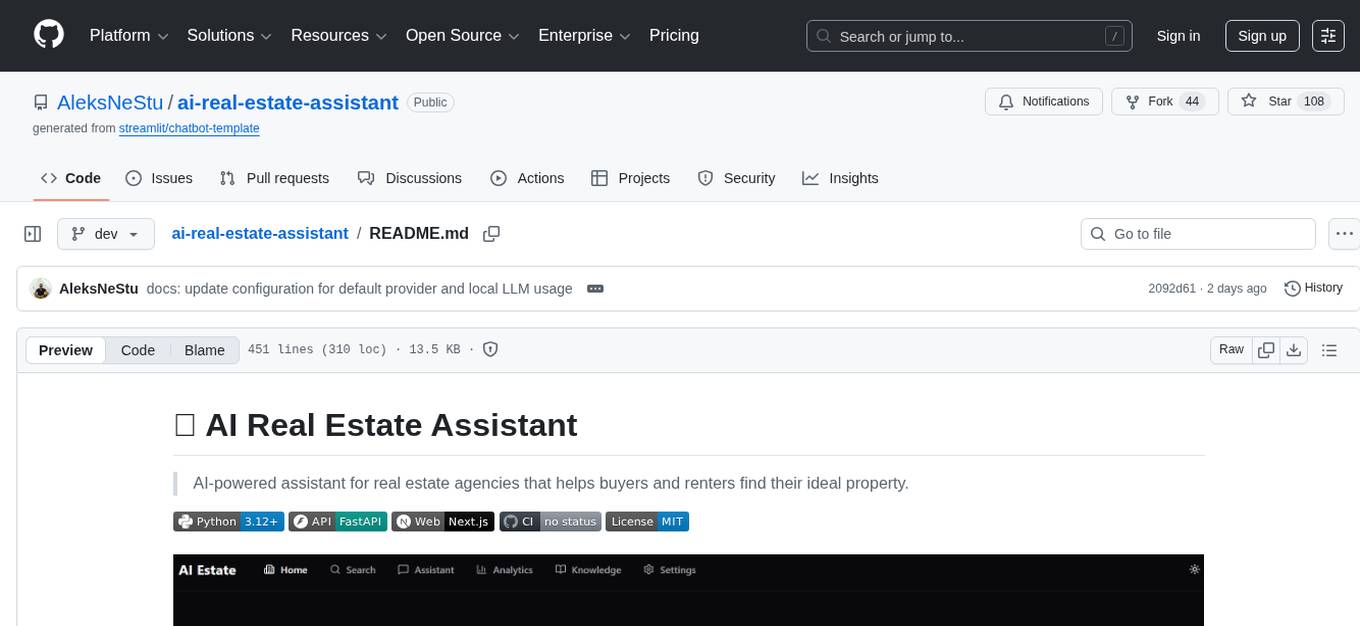
ai-real-estate-assistant
AI Real Estate Assistant is a modern platform that uses AI to assist real estate agencies in helping buyers and renters find their ideal properties. It features multiple AI model providers, intelligent query processing, advanced search and retrieval capabilities, and enhanced user experience. The tool is built with a FastAPI backend and Next.js frontend, offering semantic search, hybrid agent routing, and real-time analytics.
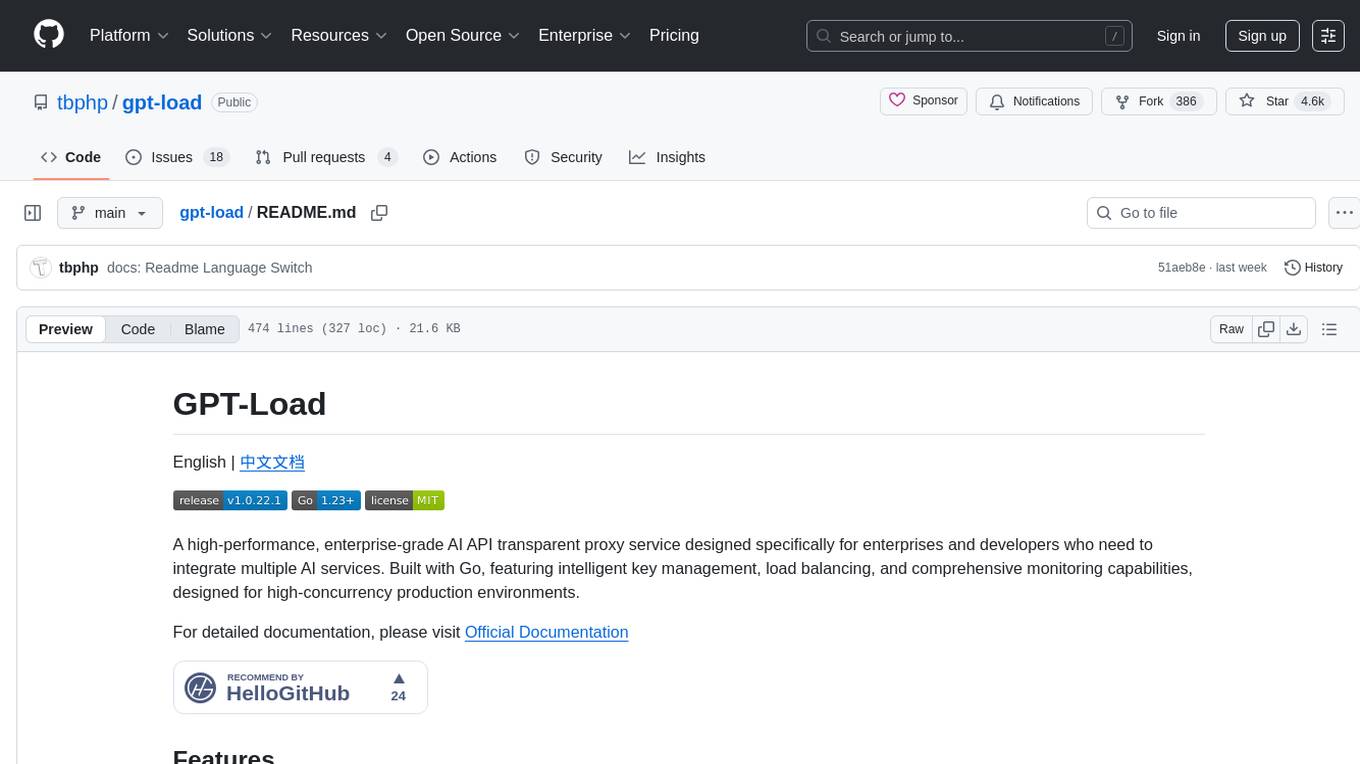
gpt-load
GPT-Load is a high-performance, enterprise-grade AI API transparent proxy service designed for enterprises and developers needing to integrate multiple AI services. Built with Go, it features intelligent key management, load balancing, and comprehensive monitoring capabilities for high-concurrency production environments. The tool serves as a transparent proxy service, preserving native API formats of various AI service providers like OpenAI, Google Gemini, and Anthropic Claude. It supports dynamic configuration, distributed leader-follower deployment, and a Vue 3-based web management interface. GPT-Load is production-ready with features like dual authentication, graceful shutdown, and error recovery.
For similar tasks

Magick
Magick is a groundbreaking visual AIDE (Artificial Intelligence Development Environment) for no-code data pipelines and multimodal agents. Magick can connect to other services and comes with nodes and templates well-suited for intelligent agents, chatbots, complex reasoning systems and realistic characters.

danswer
Danswer is an open-source Gen-AI Chat and Unified Search tool that connects to your company's docs, apps, and people. It provides a Chat interface and plugs into any LLM of your choice. Danswer can be deployed anywhere and for any scale - on a laptop, on-premise, or to cloud. Since you own the deployment, your user data and chats are fully in your own control. Danswer is MIT licensed and designed to be modular and easily extensible. The system also comes fully ready for production usage with user authentication, role management (admin/basic users), chat persistence, and a UI for configuring Personas (AI Assistants) and their Prompts. Danswer also serves as a Unified Search across all common workplace tools such as Slack, Google Drive, Confluence, etc. By combining LLMs and team specific knowledge, Danswer becomes a subject matter expert for the team. Imagine ChatGPT if it had access to your team's unique knowledge! It enables questions such as "A customer wants feature X, is this already supported?" or "Where's the pull request for feature Y?"

semantic-kernel
Semantic Kernel is an SDK that integrates Large Language Models (LLMs) like OpenAI, Azure OpenAI, and Hugging Face with conventional programming languages like C#, Python, and Java. Semantic Kernel achieves this by allowing you to define plugins that can be chained together in just a few lines of code. What makes Semantic Kernel _special_ , however, is its ability to _automatically_ orchestrate plugins with AI. With Semantic Kernel planners, you can ask an LLM to generate a plan that achieves a user's unique goal. Afterwards, Semantic Kernel will execute the plan for the user.

floneum
Floneum is a graph editor that makes it easy to develop your own AI workflows. It uses large language models (LLMs) to run AI models locally, without any external dependencies or even a GPU. This makes it easy to use LLMs with your own data, without worrying about privacy. Floneum also has a plugin system that allows you to improve the performance of LLMs and make them work better for your specific use case. Plugins can be used in any language that supports web assembly, and they can control the output of LLMs with a process similar to JSONformer or guidance.

mindsdb
MindsDB is a platform for customizing AI from enterprise data. You can create, serve, and fine-tune models in real-time from your database, vector store, and application data. MindsDB "enhances" SQL syntax with AI capabilities to make it accessible for developers worldwide. With MindsDB’s nearly 200 integrations, any developer can create AI customized for their purpose, faster and more securely. Their AI systems will constantly improve themselves — using companies’ own data, in real-time.

aiscript
AiScript is a lightweight scripting language that runs on JavaScript. It supports arrays, objects, and functions as first-class citizens, and is easy to write without the need for semicolons or commas. AiScript runs in a secure sandbox environment, preventing infinite loops from freezing the host. It also allows for easy provision of variables and functions from the host.

activepieces
Activepieces is an open source replacement for Zapier, designed to be extensible through a type-safe pieces framework written in Typescript. It features a user-friendly Workflow Builder with support for Branches, Loops, and Drag and Drop. Activepieces integrates with Google Sheets, OpenAI, Discord, and RSS, along with 80+ other integrations. The list of supported integrations continues to grow rapidly, thanks to valuable contributions from the community. Activepieces is an open ecosystem; all piece source code is available in the repository, and they are versioned and published directly to npmjs.com upon contributions. If you cannot find a specific piece on the pieces roadmap, please submit a request by visiting the following link: Request Piece Alternatively, if you are a developer, you can quickly build your own piece using our TypeScript framework. For guidance, please refer to the following guide: Contributor's Guide

superagent-js
Superagent is an open source framework that enables any developer to integrate production ready AI Assistants into any application in a matter of minutes.
For similar jobs

promptflow
**Prompt flow** is a suite of development tools designed to streamline the end-to-end development cycle of LLM-based AI applications, from ideation, prototyping, testing, evaluation to production deployment and monitoring. It makes prompt engineering much easier and enables you to build LLM apps with production quality.

deepeval
DeepEval is a simple-to-use, open-source LLM evaluation framework specialized for unit testing LLM outputs. It incorporates various metrics such as G-Eval, hallucination, answer relevancy, RAGAS, etc., and runs locally on your machine for evaluation. It provides a wide range of ready-to-use evaluation metrics, allows for creating custom metrics, integrates with any CI/CD environment, and enables benchmarking LLMs on popular benchmarks. DeepEval is designed for evaluating RAG and fine-tuning applications, helping users optimize hyperparameters, prevent prompt drifting, and transition from OpenAI to hosting their own Llama2 with confidence.

MegaDetector
MegaDetector is an AI model that identifies animals, people, and vehicles in camera trap images (which also makes it useful for eliminating blank images). This model is trained on several million images from a variety of ecosystems. MegaDetector is just one of many tools that aims to make conservation biologists more efficient with AI. If you want to learn about other ways to use AI to accelerate camera trap workflows, check out our of the field, affectionately titled "Everything I know about machine learning and camera traps".

leapfrogai
LeapfrogAI is a self-hosted AI platform designed to be deployed in air-gapped resource-constrained environments. It brings sophisticated AI solutions to these environments by hosting all the necessary components of an AI stack, including vector databases, model backends, API, and UI. LeapfrogAI's API closely matches that of OpenAI, allowing tools built for OpenAI/ChatGPT to function seamlessly with a LeapfrogAI backend. It provides several backends for various use cases, including llama-cpp-python, whisper, text-embeddings, and vllm. LeapfrogAI leverages Chainguard's apko to harden base python images, ensuring the latest supported Python versions are used by the other components of the stack. The LeapfrogAI SDK provides a standard set of protobuffs and python utilities for implementing backends and gRPC. LeapfrogAI offers UI options for common use-cases like chat, summarization, and transcription. It can be deployed and run locally via UDS and Kubernetes, built out using Zarf packages. LeapfrogAI is supported by a community of users and contributors, including Defense Unicorns, Beast Code, Chainguard, Exovera, Hypergiant, Pulze, SOSi, United States Navy, United States Air Force, and United States Space Force.

llava-docker
This Docker image for LLaVA (Large Language and Vision Assistant) provides a convenient way to run LLaVA locally or on RunPod. LLaVA is a powerful AI tool that combines natural language processing and computer vision capabilities. With this Docker image, you can easily access LLaVA's functionalities for various tasks, including image captioning, visual question answering, text summarization, and more. The image comes pre-installed with LLaVA v1.2.0, Torch 2.1.2, xformers 0.0.23.post1, and other necessary dependencies. You can customize the model used by setting the MODEL environment variable. The image also includes a Jupyter Lab environment for interactive development and exploration. Overall, this Docker image offers a comprehensive and user-friendly platform for leveraging LLaVA's capabilities.

carrot
The 'carrot' repository on GitHub provides a list of free and user-friendly ChatGPT mirror sites for easy access. The repository includes sponsored sites offering various GPT models and services. Users can find and share sites, report errors, and access stable and recommended sites for ChatGPT usage. The repository also includes a detailed list of ChatGPT sites, their features, and accessibility options, making it a valuable resource for ChatGPT users seeking free and unlimited GPT services.

TrustLLM
TrustLLM is a comprehensive study of trustworthiness in LLMs, including principles for different dimensions of trustworthiness, established benchmark, evaluation, and analysis of trustworthiness for mainstream LLMs, and discussion of open challenges and future directions. Specifically, we first propose a set of principles for trustworthy LLMs that span eight different dimensions. Based on these principles, we further establish a benchmark across six dimensions including truthfulness, safety, fairness, robustness, privacy, and machine ethics. We then present a study evaluating 16 mainstream LLMs in TrustLLM, consisting of over 30 datasets. The document explains how to use the trustllm python package to help you assess the performance of your LLM in trustworthiness more quickly. For more details about TrustLLM, please refer to project website.

AI-YinMei
AI-YinMei is an AI virtual anchor Vtuber development tool (N card version). It supports fastgpt knowledge base chat dialogue, a complete set of solutions for LLM large language models: [fastgpt] + [one-api] + [Xinference], supports docking bilibili live broadcast barrage reply and entering live broadcast welcome speech, supports Microsoft edge-tts speech synthesis, supports Bert-VITS2 speech synthesis, supports GPT-SoVITS speech synthesis, supports expression control Vtuber Studio, supports painting stable-diffusion-webui output OBS live broadcast room, supports painting picture pornography public-NSFW-y-distinguish, supports search and image search service duckduckgo (requires magic Internet access), supports image search service Baidu image search (no magic Internet access), supports AI reply chat box [html plug-in], supports AI singing Auto-Convert-Music, supports playlist [html plug-in], supports dancing function, supports expression video playback, supports head touching action, supports gift smashing action, supports singing automatic start dancing function, chat and singing automatic cycle swing action, supports multi scene switching, background music switching, day and night automatic switching scene, supports open singing and painting, let AI automatically judge the content.







